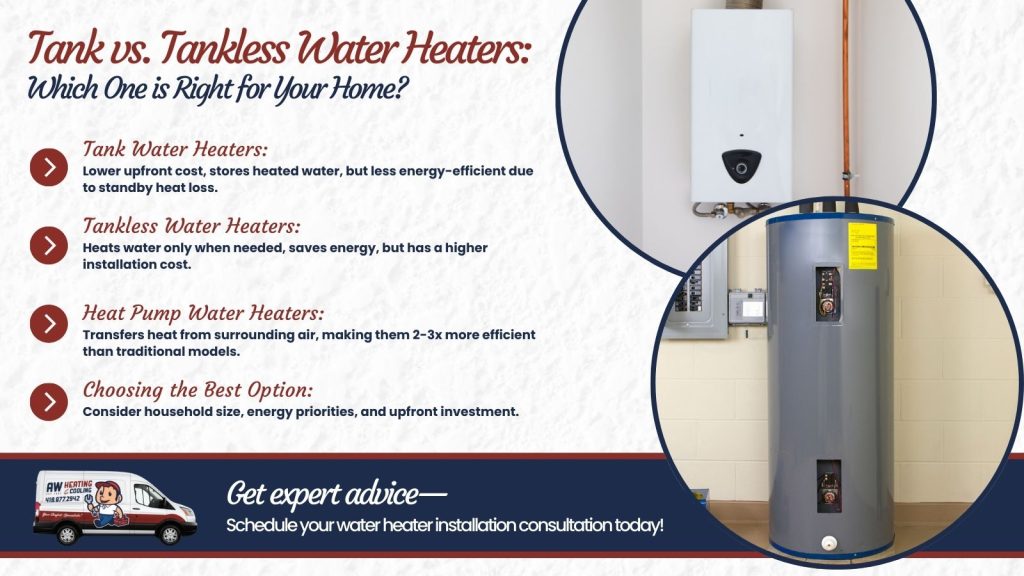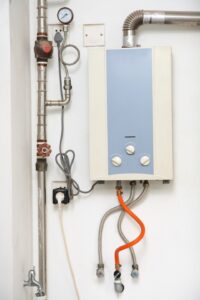When it comes to home comfort and efficiency, choosing the right water heater is a decision that can significantly impact your daily routine and energy bills. Let’s break down the differences between tank and tankless water heaters in a down-to-earth way that makes this important choice easier to understand. Whether you’re upgrading an older system or installing a new unit, this guide will help you navigate the evolving world of water heater technology.

What is a Tankless Water Heater?
A tankless water heater is a modern solution for providing hot water on demand without the need for a bulky storage tank. Unlike traditional tank-style water heaters that continuously heat and reheat a reservoir of water, tankless water heaters only heat water when you need it. This on-demand heating process makes them significantly more energy-efficient and cost-effective, particularly for households with lower to moderate hot water usage. Known also as on-demand or instantaneous water heaters, these units are designed to deliver hot water instantly, ensuring you never run out of hot water during your daily routines.
Benefits of Tankless Water Heaters
Tankless water heaters come with a host of benefits that make them an attractive option for many homeowners:
- Reduced Standby Heat Loss: Since water is heated only when needed, there’s no energy wasted on keeping a tank of water hot.
- No Risk of Tank Rot and Leaks: Without a storage tank, there’s no risk of the tank corroding or leaking.
- Energy Efficiency: Particularly beneficial for smaller households, tankless water heaters use less energy overall.
- Longer Lifespan: These units typically last longer than traditional tank-style water heaters, often up to 20 years.
- Space-Saving Design: Their compact size makes them ideal for homes with limited storage space.
- Continuous Hot Water: Even during peak demand periods, tankless water heaters can provide an endless supply of hot water.
- Reduced Risk of Water Damage: No tank means no risk of water damage from tank leaks.
- Lower Maintenance Costs: With no tank to maintain, the overall maintenance costs are lower.
- Environmentally Friendly: Using less energy and water makes these units a greener choice.
- Increased Safety: There’s no risk of scalding from overheated water stored in a tank.
How Does a Tankless Water Heater Work?
A tankless water heater operates by using a heat exchanger to warm water as it flows through the unit. When you turn on a hot water faucet, cold water enters the tankless water heater and passes through the heat exchanger, where it is rapidly heated by either a gas burner or an electric element. This process ensures that hot water is delivered instantly to your faucet, providing a continuous supply without the need for a storage tank. Tankless water heaters can be powered by gas or electricity, and some models are even designed for outdoor installation, offering flexibility in placement and use.
Pros and Cons of Tank Water Heaters
Tank water heaters have been a trusted option for homeowners for decades. These systems store a reservoir of hot water, ensuring it’s available whenever needed. Their familiar design makes them easy to maintain and repair, and they often come with a lower upfront cost compared to other options. However, because these units continuously heat a full tank of water, they can lead to energy waste when demand is low. This makes them less efficient in households with variable hot water usage, but they remain popular due to their simplicity and reliability.
Why Tankless Heaters Are Gaining Popularity
Tankless water heaters, also known as on-demand water heaters, heat water only when needed. This method eliminates the standby energy loss associated with tank models, making tankless systems a more energy-efficient choice. With a compact design and the ability to supply endless hot water during periods of high demand, they are ideal for busy households. That said, installation can be more complex and the initial cost is higher. If you’re still weighing your options, consider these 4 key benefits of tankless water heaters to see how they compare to traditional systems. If you’re considering a tank water heater or tankless water heater installation in Perrysburg, OH, our team is ready to provide expert service and guidance tailored to your specific needs.
Heat Pump Water Heaters: A Smart, Efficient Choice
An emerging technology in the realm of water heating is the heat pump water heater. This innovative system works by transferring heat from the surrounding air to the water, rather than generating heat directly. As a result, heat pump water heaters can be two to three times more energy-efficient than conventional electric models. They offer an excellent balance between performance and cost savings, especially for eco-conscious homeowners who want to reduce their carbon footprint while lowering energy bills.
Comparison of Tankless and Tank Water Heaters
When deciding between tank and tankless water heaters, it’s essential to understand their fundamental differences. Tankless water heaters, also known as on-demand water heaters, provide hot water only when needed. This means they are more energy-efficient, as they eliminate the standby energy loss associated with tank models, which constantly heat and reheat water. In contrast, tank water heaters store hot water in a tank, ensuring a ready supply but often leading to energy waste.
One of the significant advantages of tankless water heaters is their longer lifespan, typically lasting 15-20 years compared to the 10-15 years of tank water heaters. Additionally, tankless water heaters are more compact, allowing for installation closer to the point of use, which can save space and reduce heat loss. Re-circulating pumps can reduce the cold water sandwich effect during hot water use. However, they do come with a higher upfront cost, though this can be offset by long-term energy savings.
Tankless water heaters require a larger gas line to support their high BTU output, which can add to the installation complexity. Despite this, they are more environmentally friendly, using less energy and water. They also provide unlimited hot water, making them ideal for households with high hot water demand. A tankless water heater’s flow rate is the maximum volume of hot water it can provide. Unlike tank water heaters, which can run out of hot water during peak periods, tankless models ensure a continuous supply.
Moreover, tankless water heaters are more resistant to leaks and water damage since they do not store water in a tank. However, they do require annual or bi-annual descaling to prevent mineral buildup, a maintenance task not necessary for tank water heaters. Overall, tankless water heaters offer numerous benefits, making them a compelling choice for many homeowners.
Heater Installation Considerations
Proper installation is crucial for the efficient and safe operation of tankless water heaters. Proper installation also involves configuring the water pipes correctly, ensuring that the connections between hot and cold water pipes, valves, and any bypass systems are properly set up to facilitate maintenance without disrupting water flow. These units require adequate ventilation and access to gas lines, making the installation location a critical factor. Tankless water heater installation is often straightforward but requires professional installation for safety. A professional installation is essential to ensure that the tankless water heater operates safely and efficiently.
The electrical connection for a tankless water heater must be installed correctly to prevent electrical shock or fire hazards. Additionally, the gas lines must be sized appropriately to support the high BTU output of the unit. Incorrectly sized gas lines can lead to insufficient heating and potential safety issues.
Water lines must also be installed correctly to prevent leaks and water damage. The condensate line, which drains the condensation produced during heating, must be installed properly to avoid water damage and corrosion. A bypass valve may be used in tankless water heater installations for system winterization. A drain pan is necessary to catch any condensate that may leak from the unit, further protecting your home from potential water damage.
Installation of a tankless water heater must comply with local and national codes to ensure safety and warranty validity. A qualified installer should handle the installation to guarantee that the unit is installed correctly and operates safely. Regular maintenance is also essential to extend the life of the tankless water heater and ensure it continues to function efficiently.
Cost of Tankless Water Heater Installation
The cost of installing a tankless water heater can vary widely based on several factors, including the type and size of the unit, the complexity of the installation, and the specific location where it will be installed. On average, homeowners can expect to pay between $1,000 and $3,000 for a tankless water heater installation, which includes both the cost of the unit and labor. However, if additional plumbing or electrical work is required, the total cost can be higher. It’s important to get a detailed estimate from a professional installer to understand the full scope of the project.
DIY vs Professional Installation
While some homeowners may consider installing a tankless water heater themselves, it’s generally recommended to hire a professional for this task. Tankless water heaters require specialized knowledge and skills to ensure they are installed correctly and safely. Improper installation can lead to safety hazards, reduced efficiency, and increased maintenance costs. Professional installation ensures that the unit is installed correctly, meets local building codes and regulations, and operates at peak efficiency. Additionally, many manufacturers require professional installation to honor the warranty, providing peace of mind and protecting your investment.
Maintenance and Repair
Regular maintenance is vital to extend the life of your tankless water heater and ensure it operates efficiently. One of the most important maintenance tasks is an annual or bi-annual descaling service to prevent mineral buildup, which can reduce efficiency and damage the unit. Regular inspections for signs of wear and tear, such as leaks or corrosion, are also crucial.
The gas line and electrical connection should be inspected regularly to ensure safe operation. Any issues with these components can lead to serious safety hazards, so it’s essential to address them promptly. The condensate line should also be inspected to prevent water damage and corrosion, and the drain pan should be checked to ensure it is functioning correctly.
Troubleshooting services are available to diagnose and repair issues with the tankless water heater. Regular maintenance can help prevent these issues and extend the life of the unit. If problems do arise, professional repair services can fix issues such as leaks or electrical problems, ensuring the safe operation of the tankless water heater.
By keeping up with routine maintenance, you can prevent costly repairs and ensure your tankless water heater continues to provide efficient and reliable hot water for years to come. Regular maintenance not only extends the life of the unit but also ensures it operates safely and efficiently, providing peace of mind for homeowners.
How to Choose the Best Water Heater for Your Home
Selecting the best water heater for your home ultimately depends on your lifestyle, budget, and energy priorities. Tank water heaters provide a steady supply of hot water and are simple to use, whereas tankless systems offer improved energy efficiency and an endless hot water supply on demand. For help determining which type fits your household best, read about whether a tankless water heater is right for your home. For those looking to invest in cutting-edge technology, heat pump water heaters present an attractive option that combines efficiency with modern design. Evaluating the pros and cons of each system can help you make a well-informed decision that will serve your family’s needs for years to come.
Always consult a trusted professional to ensure optimal water heater performance. If you’re leaning toward modern solutions, here’s why going tankless can be a worthwhile upgrade in terms of energy savings and convenience.
Don’t forget to check out our special offer—$50 OFF the Installed Price of a Water Heater! This promotion makes upgrading your home’s water heating system even more affordable.
Contact AW Heating & Cooling, Your Comfort Specialists. We’re just a call away!

